How Social Media Affects Mental Health in Daily Life
Our everyday routines are interwoven with social media. It’s always there, whether you’re browsing Instagram during lunch or checking your tweets before bed. Although these platforms provide information, entertainment, and connections, there is growing discussion about how they might be subtly affecting our mental health.
The Relationship Between Social Media and Mental Health

Those extra minutes (or hours) spent online can be easily written off as harmless. Nonetheless, a number of studies demonstrate a clear link between social media use and different facets of mental health. Let’s examine a comparison that deconstructs various effects according to duration and type of usage:
| Social Media Usage Pattern | Positive Effects | Negative Effects |
| Light (0–1 hour/day) | Maintains casual connections | Minimal impact |
| Moderate (1–3 hours/day) | Increases social engagement | Slight increase in anxiety, comparison fatigue |
| Heavy (3–5 hours/day) | Greater access to information | Higher risk of mood swings, self-esteem issues |
| Excessive (5+ hours/day) | Constant stimulation, quick feedback loop | Sleep problems, FOMO, emotional exhaustion |
Individual experiences may differ; this table represents a broad overview. However, the pattern is unmistakable: the likelihood of mental health issues rises with screen time.
Emotional Impacts That Often Go Unnoticed
Why is social media such a potent psychological tool? The manner in which it is ingested is just as important as the content. We can see more of what we linger on thanks to algorithms. The feed frequently perpetuates feelings of loneliness, anxiety, or inadequacy by showcasing meticulously curated, romanticized depictions of other people’s lives.
Users feel worse as a result, but they keep going back to social media sites in search of solace or approval.
Comparison and Self-Worth
Comparison is one of the most prevalent problems people encounter on social media. It’s difficult to avoid comparing your own life to someone else’s, whether it’s their vacation pictures, professional achievements, or idyllic relationships.
The emotional response occurs almost immediately, even if you rationally know that a large portion of what you see has been staged, edited, or filtered. This can erode self-esteem over time, resulting in depression and feelings of inadequacy.
The Dopamine Trap and Addiction
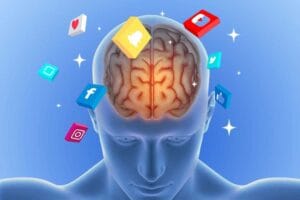
Likes, shares, and comments are psychological triggers rather than merely features. Dopamine is released into the brain with each notification, producing a fleeting feeling of reward. We keep checking back because of this. It is intentionally addictive.
The issue? Long-term satisfaction is not provided by this feedback loop. Rather, when posts don’t do “well” or when people don’t reply, it can cause anxiety. Users’ offline confidence may be impacted if they begin to link their worth to online validation.
Sleep Disruption and Its Mental Consequences
Despite being one of the worst habits for mental health, scrolling in bed has become a modern ritual. Screen blue light inhibits the production of melatonin, which makes it more difficult to fall asleep.
Focus, emotional resilience, and mood regulation are all impacted by inadequate sleep. This eventually turns into a vicious cycle where people use their phones to cope when they’re feeling worse, which makes the issue worse.
Cyberbullying and Online Harassment
Regretfully, not every social media interaction is constructive. Cyberbullying can be a traumatic experience for adults as well as teenagers. Online harassment can result in:
- Depression and Anxiety.
- Social disengagement.
- Suicidal thoughts in difficult situations.
People’s worst sides can be brought out by the anonymity of the internet. And the emotional scars left by digital abuse often run deep.
Social Media and Anxiety: A Subtle Connection
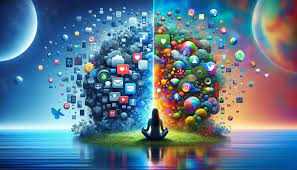
Social media can subtly cause anxiety, even if you’re not being bullied or overwhelmed by comparison. For instance:
- Feeling under pressure to reply to messages right away.
- Having trouble deciding what to post.
- Concerned about who saw your story.
- FOMO, or the fear of missing out.
These may not seem like much, but they do add up. The low-level stress may not even be apparent to you until it shows up as weariness, emotional exhaustion, or irritability.
How to Reduce Negative Impacts Without Quitting
It’s not always necessary or feasible for everyone to give up social media entirely. Instead, concentrate on your use of it. The following actions can be helpful:
- Give each app a daily time limit.
- Disable notifications that are not necessary.
- Unfollow accounts that make you feel unworthy.
- Arrange phone-free periods, particularly before bed. Add motivational or educational content to your feed.
- Intentionally participate rather than out of boredom.
When to Seek Help
You should consult a mental health professional if you experience significant mood swings after using social media or if you’re dealing with ongoing feelings of inadequacy. You’re not weak for asking for help; you’re smart for recognizing when you need it.
Final Thoughts
Social media is just a tool; it has no inherent virtues or disadvantages. How, why, and how much we use it determines how it affects our mental health. It can encourage learning, creativity, and connection in day-to-day living. However, it can also cause anxiety, encourage comparison, and subtly deplete our emotional reserves.
The first step is awareness. You can safeguard your mental health without completely giving up the digital world by being aware of your habits and making tiny, deliberate adjustments. Keep in mind that you are in charge of your feed, not the other way around.
FAQs
What is the long-term impact of social media on mental health?
A: Prolonged use of social media, particularly if usage patterns are excessive or emotionally upsetting, can result in elevated anxiety, depression, and diminished self-esteem.
Could depression result from using social media?
A: Constant comparison, online harassment, and exposure to negative content can exacerbate or cause depression, even though they may not be the direct cause.
Is it beneficial for mental health to remove oneself from social media?
A: Some people find that taking a break or uninstalling apps completely helps them focus better, feel happier, and experience less stress. But it depends on the needs and habits of the individual.
How much time is spent on social media is excessive?
A: If it interferes with sleep, relationships, or productivity, more than three hours a day may begin to negatively impact mental health.
Which age group is most affected by social media’s detrimental effects on mental health?
A: Although adults can also be impacted, social pressures and identity formation tend to make teenagers and young adults more vulnerable.
Is it ever possible for social media to improve mental health?
A: Social media can provide connections, educational materials, and support groups that lessen loneliness and raise awareness of mental health issues when used constructively.
Which signs indicate that social media is having a detrimental impact on my mental health?
A: Mood swings following scrolling, feelings of anxiety or inadequacy, disturbed sleep, difficulty concentrating, and a need for continual approval from likes or comments are all warning signs.

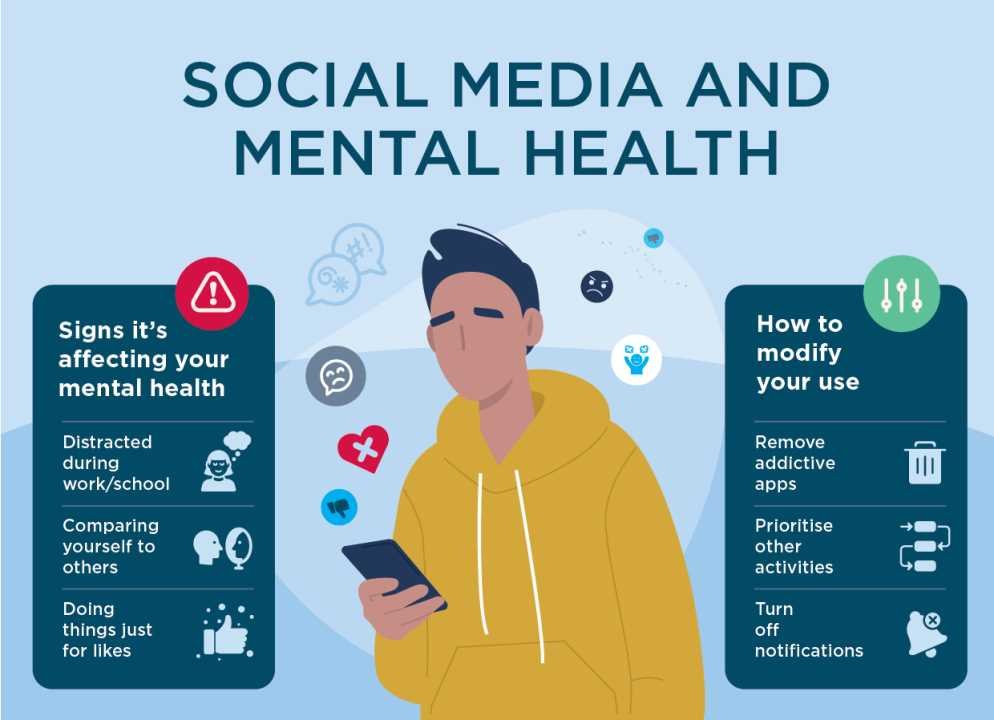
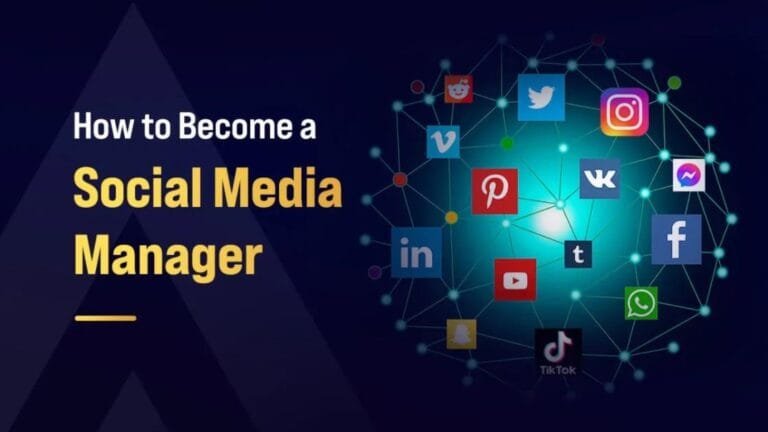


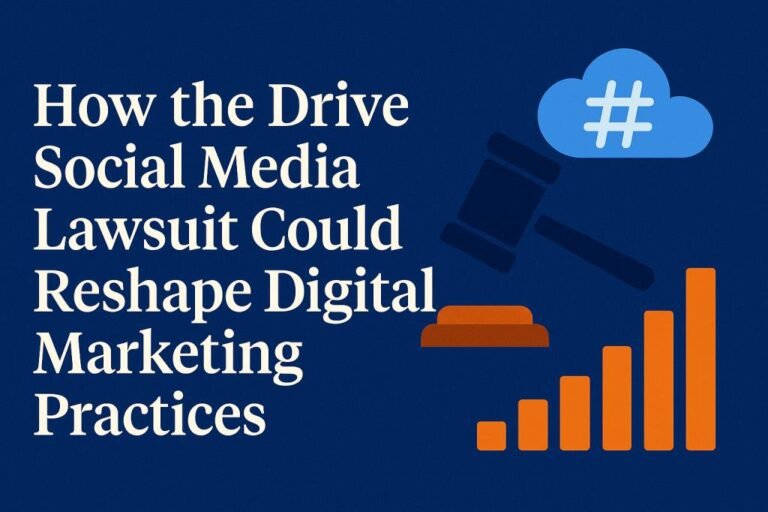
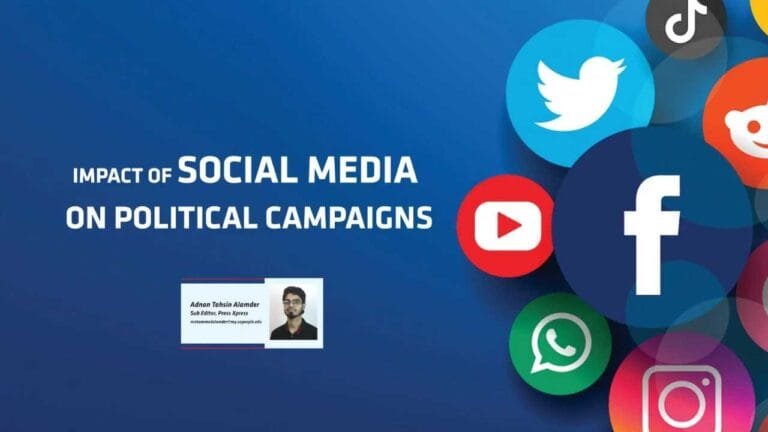

2 Comments